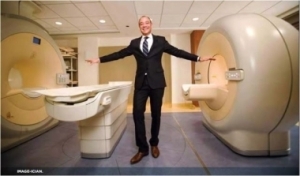by
Brendon Nafziger, DOTmed News Associate Editor | January 26, 2011

Dr. Zahi Fayad with
Philips' Ingenuity TF PET-MR
(Image courtesy
Philips Healthcare)
A joint PET-MR scanner that's been hailed as the first new modality in a decade is now commercially available in Europe and under review by U.S. authorities for American approval, DOTmed News has learned.
Royal Philips Electronics said Tuesday its Ingenuity TF PET-MR scanner received CE Marking, meaning it could now be sold throughout most of the European Union. The Dutch conglomerate also said it has filed papers to bring the device to the United States.
Researchers affiliated with Philips who have studied the scanner think it could help streamline patient care and speculate it could be useful for some cancer or cardiovascular conditions. It would also use less ionizing radiation than a PET-CT scan.



Ad Statistics
Times Displayed: 75267
Times Visited: 5317 MIT labs, experts in Multi-Vendor component level repair of: MRI Coils, RF amplifiers, Gradient Amplifiers Contrast Media Injectors. System repairs, sub-assembly repairs, component level repairs, refurbish/calibrate. info@mitlabsusa.com/+1 (305) 470-8013
The scanner features a rotating turntable letting patients connect with separate MRI and PET scanners.
For U.S. radiologists, the device made its
public debut at the Radiological Society of North America's annual meeting in November.
Two devices are operating at test sites in University of Geneva and the Mount Sinai Medical Center in New York, and a third was installed recently at the Helmholtz-Zentrum Dresden-Rossendorf Center in Germany, for physics research. At RSNA, Philips said the company had received about a dozen orders.
One of the device investigators, Dr. Zahi Fayad, professor of radiology and medicine and director of the Translational and Molecular Imaging Institute at Mount Sinai, said his hypothesis is that the Ingenuity's clinical utility would initially be seen in head and neck and prostate cancer cases, where high-resolution images are needed.
"I think it's going to be in the areas we're not doing well with PET-CT," he told DOTmed News. "People need to get used to it, then begin knocking down the indications one by one."
Philips said the company submitted the application for U.S. Food and Drug Administration 510(k) clearance, required for the device to be sold in the United States, in mid-November.
For the submission, researchers included 75 cases involving cancer patients, comparing results from PET/CT with PET/MR. Fayad said they couldn't reveal more information as they were planning on publishing it, but that he was pleased with the outcome.
"It was extremely successful, beautiful really," he said.
What the FDA thinks should be learned soon, as the company expects feedback from the agency in the next three to four weeks.
For European institutions wanting to buy it now, the target asking price for research is around $4.5 million, said Troy Havens, senior manager of PET product marketing with Philips.
Fayad said the true usefulness of the device might only emerge once other institutions begin to do work on it. "To be fair, we have to put it into the hands of other evaluators. We just scratched the surface."
Philips' rival Siemens Healthcare has an integrated PET-MR unit, the Biograph mMR,
also in development. An early version was shown three years ago, and the current model was announced at RSNA last year.

